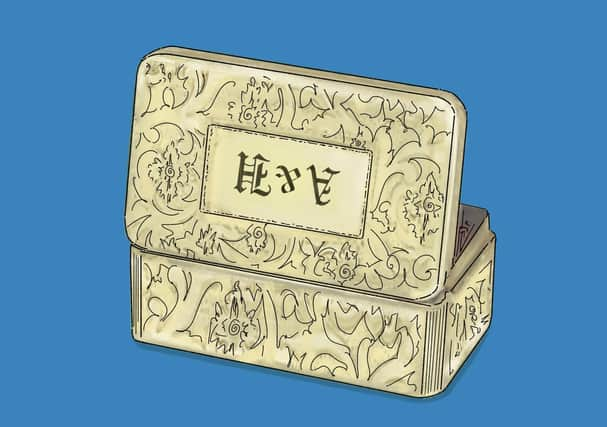Edward Kane, Advocate in The Supernal Sisters. Chapter 3: ‘A Distasteful Joke’


In the consulting rooms of Abernathy and Hawkes, introductions were effected with a number of small bows and the shake of the young man’s (limp and uninterested) hand then the two solicitors, the Advocate and the client finally sat around the table. Down to business. Hawkes, in contrast to his somewhat languid partner, was immediately animated and insistent:
‘First, Mr Kane, apologies for any delay. Our client required to be…required to be….’
Advertisement
Hide AdThe young Harry interrupted: ‘Don’t beat about the bush, Hawkes - I was asleep. Had quite forgotten about this ridiculous little affair today…’


Kane thought to himself: …a ‘ridiculous little affair’…involving a rich man, two partners of a law firm and an Advocate - what an odd way to begin a consultation…
Hawkes looked up: ‘You’re probably wondering why we have instructed you in particular, Mr Kane?’ Hawkes gave a nervous smile, then realised that he had been somewhat gauche: ‘Oh, I do hope you take no offence from my comment, sir?’
Kane returned the smile. (He had wondered the same thing himself as he walked into those plush offices). The Advocate gave a little nod to indicate that Hawkes should proceed.
The solicitor stumbled a little at first, but soon warmed to his task: ‘You see, the situation…the situation is somewhat delicate and Mr Humbie here,’ he nodded over to the client (who did not look too engaged), ‘he has something of a social standing. And if we were to instruct, say, the Dean of Faculty or perhaps an Advocate of superior rank, then the word might spread that…’
Kane held up his hand to indicate that the solicitor did not have to explain further. In plain words, this entitled young man across the table wanted to raise something with the courts and did not want anyone in his social circle – the Dean of Faculty or perhaps those school friends called to the Bar – to be alerted to his folly. Kane could almost see them guffawing around the dinner table in Drummond Place. Better to instruct a person of no great social standing who did not travel in those rarefied circles. Who better than an impoverished Son of the Manse with no social cachet at all? Who better than struggling young Advocate, Edward Kane?
Advertisement
Hide AdHawkes reached into his briefcase and produced a piece of paper: ‘You will forgive me, Mr Kane, for the cloak of secrecy here, but I have prepared – by my own hand – a short Memorandum for you and I did not want to leave this in public, sir – even in an Advocate’s box.’
He handed the paper over to Kane: ‘And I should be grateful if you could hand it back when finished. By all means, make your own notes, but even in those, please leave out of account anything that might identify the parties.’
Advertisement
Hide AdKane took the paper and began to study it. Then he looked up to see Hawkes offering an engraved golden box: ‘Snuff, Mr Kane?’
*****
Despite the circumlocution with which the legal problem had been expressed on paper (understandable, since, after all, lawyers were paid by the word) the sense of the situation soon became clear. The languid young man’s father – Alexander Humbie h- ad suffered an unexpected death. He had been travelling by coach from Edinburgh to Glasgow on a last-minute business mission when he was taken ill. He complained that he had double vision and that he was feeling extremely confused. This was unusual for a man normally as fit as he was. The coachman stopped at a post house at Falkirk and took the ailing fish magnate inside to see if anything could be done. While outside the coach house, the coach – and its remaining passengers – fell prey to a gang of robbers. The robbers took everything of value from the coach and the passengers: rings, gold watches, necklaces, engraved walking sticks and – most importantly in this case – the manifest containing the names and details of those travelling. Alexander Humbie fell asleep in that coach house and never woke up again. He died alone. No-one knew who he was. The manifest containing his name had been stolen. Also, there was no record of him in the Edinburgh office, Humbie being the last-minute passenger on the coach. The body lay unclaimed in the coach house for two days and then – as was permitted by the 1832 Anatomy Act – was duly certificated as an unclaimed body, then taken to the Anatomy Rooms of Edinburgh University for dissection, where the anonymous body of Alexander Humbie – fish magnate – was gutted before an invited room of students and paying guests.
Kane looked up and was suddenly conscious that the lawyers and the client were studying him. He looked towards the son, Harry Humbie: ‘My commiserations, Mr Humbie. It must have been of great distress to you to lose your father in such a fashion. Especially…’
The young man shrugged, said nothing and looked towards the window. Hawkes, the solicitor, filled the silence: ‘Mr Kane, sir, now that you have been apprised of the circumstances, you will be wondering what your part of this affair might entail.’
Kane nodded. Although - in truth - the young Advocate had been so engrossed in the reading of the tale of the unfortunate Alexander Humbie that he had, for a time, forgotten why he was there. Not only that, but there was now the faint beginning of an awful headache.
Hawkes continued: ‘You see, when the body of the unfortunate Alexander Humbie was, um…’ (in deference to the sensitivities of the deceased’s only son sitting across the table, he was reluctant to say the word ‘dissected’) ‘…when the body was examined. Our client informs us that it was found to contain a considerable quantity of arsenic.’
Advertisement
Hide AdIt was only now that the client spoke: ‘My father was poisoned, Mr Kane. He must have been. Probably by a jealous rival.’
Kane sat back in his chair and tried not to show his surprise: ‘And what makes you think that, sir? That your father was poisoned.’
‘Because I was told.’
‘By whom?’
‘By my dead father, Mr Kane. By my dead father…’
Edward Kane and Mr Horse Collected Short Stories Volume 1 is available on Amazon, Kindle and from all good bookshops
Comments
Want to join the conversation? Please or to comment on this article.